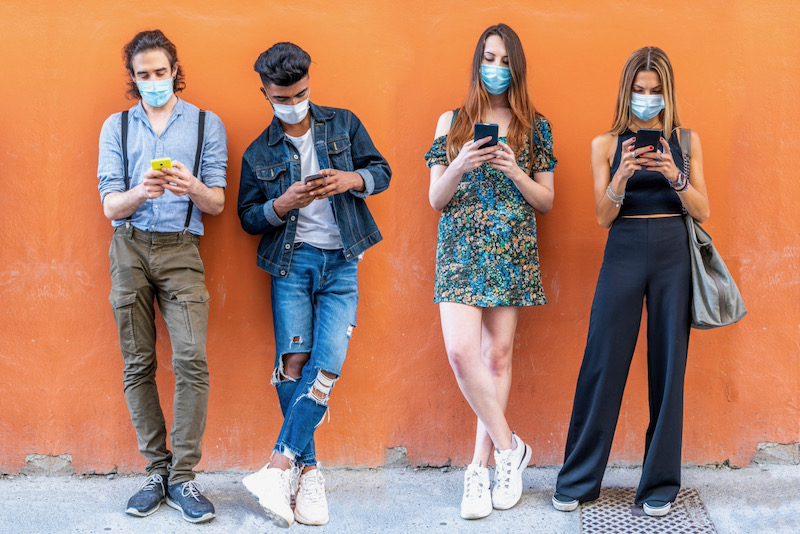It appears that the choice about whether to wear a piece of cloth on our faces has become the latest front in the culture war. As so-called freedom day approaches for the chucking out of all remaining covid rules, I don’t know anyone who isn’t sick of all the restrictions we have had to endure over the last 16 months. We all long for a return to some normality, and this includes the ability to walk around in public indoor spaces without a mask. As someone who spends up to eight hours a week on public transport commuting between London and the Lakes, I can say that it is at least a little bit uncomfortable and pretty boring to be masked up for all this time.
Now, after months of telling us what to do, and as vaccinations start to protect us from the virus, the government is emphasising personal responsibility rather than rule-keeping. And the choice to mask or not to mask is getting controversial.
Which is odd, because no one loves rules in public places more than the British. We cannot abide the crime of queue jumping. It’s just plain rude. But I reckon that choosing to throw away our masks whilst Covid cases are shooting up all over the country is a far worse faux pas than queue jumping.
Nevertheless I have seen some Christians getting especially outraged at mask wearing and indeed celebrating their de-masking in ways that make me think of Mel Gibson’s battle cry in Braveheart. Perhaps we are in danger of getting caught up in the echo chamber of our own culture war tribes, so outraged at the provocative comments of the other side, and thus seeing mask-wearing as some kind of dreadful virtue-signalling.
I’ve even seen people using mask/no mask as a proxy for Remain/Leave for those who want to continue the bitter Brexit battles of the last five years and exert power over the choices of the other side. For example, there's a belief among some people that taking back control of our borders and our country is all about getting rid of the restrictions dictated to us by others, and doubling down on our personal freedoms; and that throwing away the restrictions of mask is another aspect of this.
I hope I’m not the only one who thinks that this is very, very silly.
The whole debate needs reframing. To wear a mask or not has been presented as a clash between the sunlit uplands freedom and a fear that clings to draconian restrictions; an excuse for the government to use Covid to maintain indefinite control over its citizens.
But we should surely view it instead as a sign of care and compassion for those more vulnerable or at risk, or – yes – more fearful than we might be. The whole point of wearing a mask is to protect each other, not just ourselves. Studies ( ...as opposed to that post you saw on Facebook... ) clearly show that masks help mitigate the spread of droplets from your mouth if you cough, sneeze or laugh. And after months of restrictions, many people are understandably nervous about a big-bang bonfire of everything we have come to hate. This will include those who are still clinically vulnerable, many people with children, who are at low risk of getting very ill but are still catching and transmitting the virus, and those who are simply anxious.
Have we become so exercised by the need to protect our personal freedoms that we have lost the far more important need to consider the situation of others? Have we become so convinced that the other side has a nefarious and controlling hidden agenda that we’ve forget the basic principles of human compassion?
For those whom wearing a mask causes a genuine problem, they will already be exempt, but it’s a minor inconvenience for the rest of us. Wearing a mask around others in an enclosed space is basic politeness, a bit like deciding not to smoke indoors around other people. Indoor smokers are not warriors for freedom, they are extremely unneighbourly and antisocial, and indeed may cause physical harm to others by their behaviour.
At the moment, if you see someone without a mask, our generous assumption is that they must have an unseen condition. However, once the rules are relaxed, if we see someone without a mask we won’t know for sure whether that’s because they have a medical condition, or whether they are just a latter day Mel Gibson bravely fighting for freedom (or – in reality – like one of those people who smoke in other people’s faces).
Christians often criticise our highly individualistic culture because in the Bible we are charged to accept meekly our own suffering and persecution, while being far more concerned about the rights and wellbeing of others. Are we at risk here of doing the opposite on the whole mask-wearing issue? We might want to be free of the mask, but if we are to be good neighbours we will accept that hardship as we seek to care for others.
Jesus did not stand on his rights and freedoms. He could have called down angels from heaven to free him from the Roman authorities, but instead he voluntarily gave everything up for us, because he loves us. Personal responsibility is not about defending our rights at all costs or calling people neurotic because they aren’t ready to give up on mask-wearing just yet. Instead it is about remembering that we are constantly in relationship with others and should be treating them with the love and compassion that Jesus has shown to us.
Tim Farron has been the Member of Parliament for Westmorland and Lonsdale since 2005, and served as the Leader of the Liberal Democrat Party from 2015 to 2017. Tim is also the host of A Mucky Business podcast, which unpacks the murky world of politics and encourages believers around the UK to engage prayerfully. You can find it on your chosen podcast provider.



 Loading ...
Loading ...
What do you think?
You can post as a subscriber user ...
User comments (0)